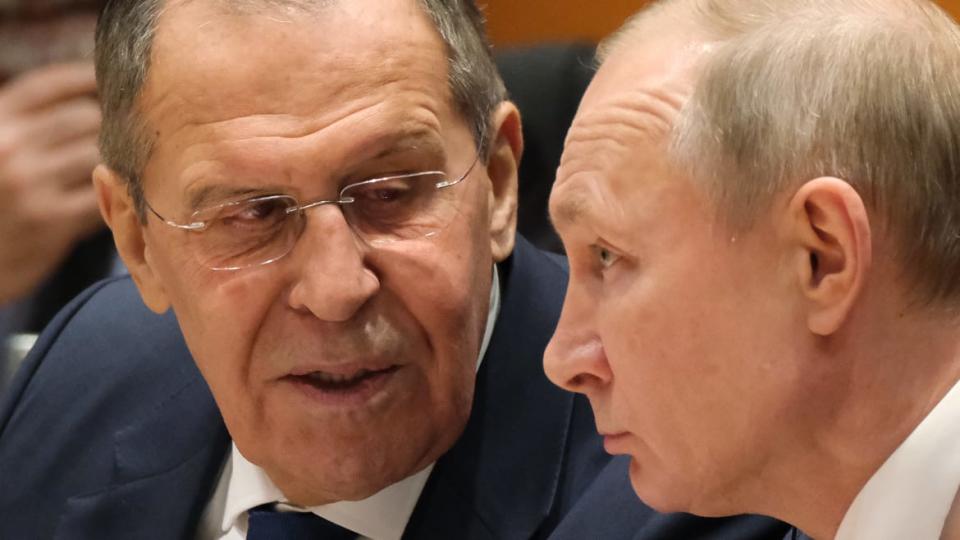Top Russian Official Teases ‘the Next Ukraine’ in New Threat

Russia’s top diplomat said the actions of Western nations could soon turn Moldova into the “next Ukraine,” according to TASS.
Russian Foreign Minister Sergei Lavrov accused Moldovan President Maia Sandu of being “eager to join NATO.” Sandu, Lavrov said, is “ready to unite with Romania and in fact, to do almost anything.”
Romania is a member of North Atlantic Treaty Organization (NATO), which was created to provide collective security against Russia.
Lavrov’s comments appeared to echo complaints Russian President Vladimir Putin made about Ukraine and NATO when announcing Russia’s invasion into Ukraine last year. Putin cited the expansion of the alliance and Ukraine’s interest in joining NATO as “fundamental threats” against Russia in his speech justifying invasion.
“Further expansion of the NATO infrastructure... are unacceptable for us,” Putin said at the time.
Lavrov’s comments come as western officials warn that Russia may be gearing up for a new offensive nearly one year into the war in Ukraine. It’s not the first time tensions have flared over whether Russia might be eyeing Moldova as an extension of the conflict in Ukraine. Moldova’s Intelligence and Security Services (SIS) has previously warned that Russia may seek to connect Russian-controlled areas in Ukraine by conducting a new offensive, and then creating a land corridor with the Russian-backed breakaway region of Transnistria in Moldova.
The head of SIS, Alexandru Musteata, warned in December that a campaign to go after Moldova appeared inevitable.
“The question is not whether the Russian Federation will launch a new offensive in the direction of Moldovan territory, but when it will happen: either at the beginning of the year, in January, February, or later, in March, (or) April,” Musteata told TVR Moldova. “This is a real and very high risk.”
Moldova declared independence from the Soviet Union in 1991. One year later, Russian-backed separatists started a conflict in Transnistria and now control the region, which borders Ukraine.
“Judging by the information we have… Russia can go further to create a corridor with the Transnistrian region, which is the territory of Moldova,” Musteata said.
The agency later issued a statement reaffirming that an offensive was possible.
“A new offensive of the Russian Federation in this direction could take place in 2023,” the agency said.
Moldova is still not a member of NATO, which maintains a collective defense agreement. When Moldova gained European Union candidate status last year, Lavrov suggested that Moldova wanted to "annul everything Russian, just like in Ukraine."
Lavrov warned Thursday that Moscow thinks that Moldovan officials “are prepared to resolve the Transnistria issue by force.”
Moldova’s Ministry of Foreign Affairs lambasted Lavrov for his threats Thursday.
“We reject the statements with regard to Moldova of the Russian FM Sergey Lavrov,” a ministry spokesperson, Daniel Vodă, said. “Moldovans regardless of political or geopolitical preferences want Peace, Freedom, and Democracy.”
There are some signs coming from Transnistria that could indicate trouble ahead from Russia, according to Ukrainian authorities. Approximately 1,000 young and middle-aged men in recent months have flocked to Transnistria, which has raised suspicions about whether they are waiting for orders, Ukraine’s Armed Forces told VOA News in December.
Lavrov has previously warned Moldova about retaliation if Russia perceives that its troops in Transnistria are threatened.
“Any action that would threaten the security of our troops would be considered under international law as an attack on Russia,” Lavrov said in September.
Russia’s efforts to subvert Moldovan rule and destabilize Moldova from within run deep, according to the U.S. Treasury Department. Last year, the Treasury Department sanctioned oligarchs and other entities linked to the Russian government for running influence operations in Moldova and “acting as instruments of Russia’s global influence campaign.”
Moldova has already fallen in the crosshairs of Russia’s invasion into Ukraine. Debris from Russia missile strikes against Ukraine has fallen into Moldova at least three times, according to Moldovan authorities.
The country is incredibly vulnerable to Russia’s energy dominance as well; 70 percent of Moldova’s electricity supplies has historically come from Russian-occupied Transnistria, with approximately 20 percent coming from Ukraine. When Russia struck Ukrainian energy infrastructure during the war, Moldova had its lights cut as well. Making matters worse, Gazprom also decreased gas supplies to Moldova by one-third in October.
According to the Moldovan government, Russia’s effort to control its energy supplies are aimed at influencing Moldova out of the EU orbit and back into Russia’s.
“They don't want us to keep going on the European Union path ... they want to keep Moldova under their zone of interest,” Moldovan Infrastructure Minister and Deputy Prime Minister Andrei Spînu told Politico in November.
Get the Daily Beast's biggest scoops and scandals delivered right to your inbox. Sign up now.
Stay informed and gain unlimited access to the Daily Beast's unmatched reporting. Subscribe now.

 money
money 